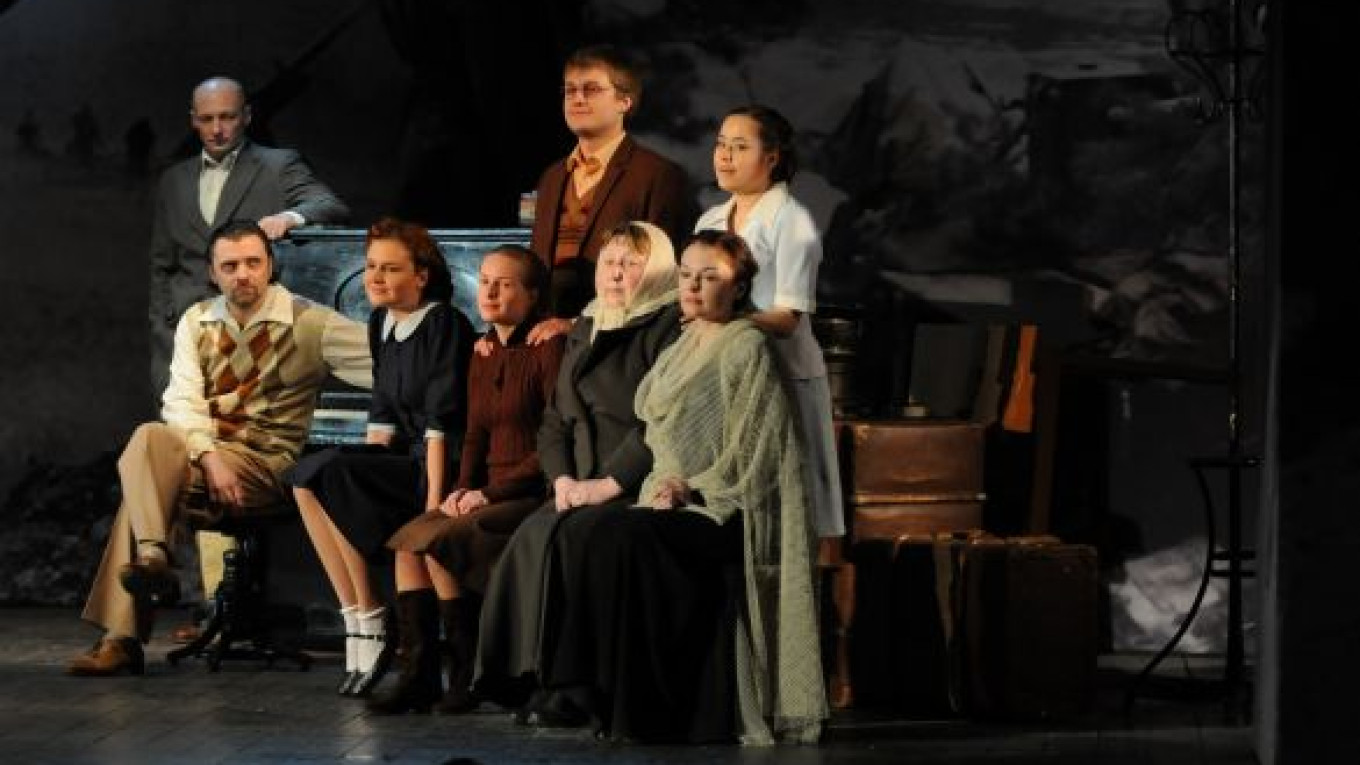The brand-new Sovremennik Theater opened its doors with this play, which was an enormous hit, and shortly thereafter Rozov rewrote it as a script for the film “The Cranes Are Flying,” which won the Grand Prize at Cannes in 1958.
Virtually everyone from World War II and Thaw-era generations of Russians saw themselves reflected in Viktor Rozov’s plays.
Later generations have moved farther and farther away from Rozov’s earnest and touching explorations of morality and social conscience. So much so, in fact, that I cannot remember the last time a major revival of one of Rozov’s key plays was mounted.
This alone makes Boris Morozov’s new production of “Alive Forever” at the Russian Army Theater an event. That is doubly true because this tale of duty, love and betrayal in a time of war was mounted in honor of Sunday’s 65th anniversary celebration of the Soviet Union’s victory over Nazi Germany.
There is no getting around the fact that the momentous occasion of Victory Day colors any opinions one might have about this production.
I attended a performance that opened the 12th annual This Day of Victory Television and Theater Festival, and it was clear that many spectators saw and heard what they expected and hoped to see. At times I felt as though I was not in a theater at all but was a witness to a solemn ritual that had deep spiritual meaning for those gathered.
As one speaker said before the performance got underway, “Every person in this audience lost some family member to this war.”
This is one reason why “Alive Forever” was such a shock success when it first appeared.
Rozov sought in his play to incorporate all of society — the good and the bad, the heroic and the heinous. The brave young Boris who goes off to war and sacrifices himself is not even at the center of the play. Instead, the action revolves largely around Veronika, the girl he left behind and who loses her sense of direction, and his unscrupulous, selfish cousin Mark who moves in to take Boris’ place in her life.
Coming just 10 years after the end of the war, a time when the country was still severely scarred physically and psychologically, this was nothing short of revolutionary. Rozov was the first to remind a nation that even in a time of war, and certainly in the time that follows, the human experience is made up of competing interests and conflict.
If most of the characters in “Alive Forever” strike us as cliched now, it is worth remembering that Rozov was one of the key architects of the cliche. His intellectuals — in this case, doctors, teachers and musicians — as well as his workers and scheming opportunists all shared an attractive sense of humanity, and they struck audiences as innovations at the time.
Rozov’s text still has the ability to hold an audience in thrall. Almost every monologue of characters remembering a lost loved one or ruminating about the hard choices life has forced on them was delivered amid rapt silence. Moments like this are rare in theater and memorable when they happen.
On the other hand, Morozov’s realistic, sentimental production makes no effort to interpret this old play in a contemporary manner. That struck me as a missed opportunity.
Several great Soviet writers have found new life in the last decade or so, Alexei Arbuzov and Alexander Volodin among them. Rozov has not been part of this reconsideration of the Soviet legacy, and a production like Morozov’s will not change that.
Among the actors, Yelena Anisimova turned in the only performance big and rich enough to take on a life of its own. As Nyura, an annoying cafeteria worker that everyone tolerates because she has access to rationed foodstuffs, she picked her teeth, wobbled her body, cast about furtive glances and unleashed shotgun bursts of dialogue in a tour de force of comic acting.
Primarily, however, “Alive Forever” at the Russian Army Theater is offered up as part of a celebration that is nothing less than sacred in Russia. On that level it is a categorical success.
“Alive Forever” (Vechno Zhiviye) plays Sun. at 6 p.m. and May 14 and 27 at 7 p.m. on the small stage of the Russian Army Theater, located at 2 Suvorovskaya Ploshchad. Metro Mendeleyevskaya. Tel. 681-5120, 681-2110, www.catra.su.
Running time: 2 hours, 50 minutes.
A Message from The Moscow Times:
Dear readers,
We are facing unprecedented challenges. Russia's Prosecutor General's Office has designated The Moscow Times as an "undesirable" organization, criminalizing our work and putting our staff at risk of prosecution. This follows our earlier unjust labeling as a "foreign agent."
These actions are direct attempts to silence independent journalism in Russia. The authorities claim our work "discredits the decisions of the Russian leadership." We see things differently: we strive to provide accurate, unbiased reporting on Russia.
We, the journalists of The Moscow Times, refuse to be silenced. But to continue our work, we need your help.
Your support, no matter how small, makes a world of difference. If you can, please support us monthly starting from just $2. It's quick to set up, and every contribution makes a significant impact.
By supporting The Moscow Times, you're defending open, independent journalism in the face of repression. Thank you for standing with us.
Remind me later.


